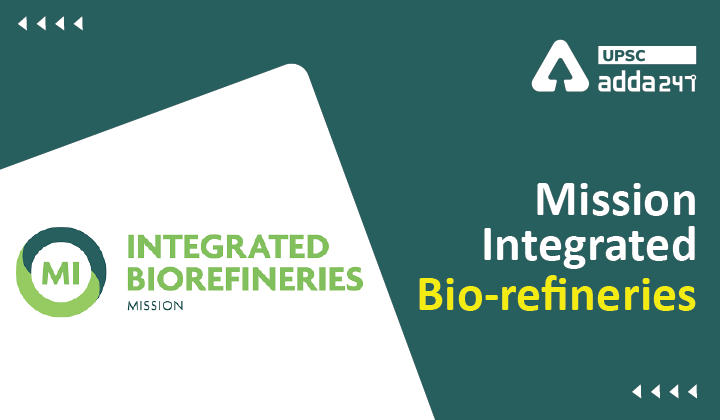Table of Contents
Mission Integrated Biorefineries UPSC: Relevance
- GS 3: Conservation, environmental pollution and degradation, environmental impact assessment.
Mission Innovation UPSC: Context
- Recently, Ministry of Science & Technology has launched Mission Integrated Bio-refineries, a futuristic initiative to accelerate clean energy solutions through Public -Private Partnerships (PPP).
Mission Integrated Biorefineries: Key points
- The Minister has also announced the National Funding Opportunity on Sustainable Aviation Fuels to support and conduct RD&D (Research, Development & Demonstration) to foster bio- technological innovations for low carbon pathways for cleaner biofuels for aviation applications.
- The Ministry also announced the funding opportunity of Hydrogen Valley Platform, which is also a global initiative to optimise the hydrogen demand and supply by onsite generation and utilization, utilize the renewable resources effectively, and water excess areas with geographical identity.
- The Ministry also launched three Material Acceleration Platforms (MAP) set up by Department of Science and Technology (DST) on Integrated Clean Energy Material Acceleration Platform on Storage, Integrated Clean Energy Material Acceleration Platform on Materials and Integrated Clean Energy Material Acceleration Platform on Bioenergy and Hydrogen with a total cost of $ 6 Million USD.
About Mission Integrated Bio-refineries
- Mission Integrated Bio-refineries is a co-led initiative of India and Netherlands.
- The Mission unites a dynamic and results-oriented partnership of a variety of stakeholders including countries, international organizations, among others, to accelerate innovation for renewable fuels, chemicals, and materials for a low- carbon future.
- The full launch of Mission Integrated Bio-refineries comes in the wake of the soft launch in November last year at COP26 side event at the Mission Innovation annual gathering.
- The Mission brings together a dynamic and delivery-focused alliance of countries, the private sector, research institutes, and civil society to accelerate innovation in renewable fuels, chemicals, and materials for a low-carbon future.
Mission Integrated Bio-refineries: Why needed?
- Greenhouse gas emissions from the transport and chemicals sectors account for nearly one-third of global emissions with transport responsible for already one-fourth of them, and are projected to increase by 2050, in particular from transport.
- Therefore, there is a need for low-carbon and renewable alternatives to fossil-based fuels, chemicals, and materials, particularly in hard-to-abate sectors such as, long-haul transportation, and industry.
Goal of Mission Integrated Bio-refineries
- Develop and demonstrate innovative solutions to accelerate the commercialization of integrated biorefineries, with a target of replacing 10% of fossil-based fuels, chemicals and materials with bio-based alternatives by 2030
About Mission Innovation
- Mission Innovation is a global initiative catalysing a decade of action and investment in research, development and demonstration to make clean energy affordable, attractive and accessible for all.
- It was launched in 2015, alongside Paris agreement.
- The Mission will accelerate progress towards the Paris Agreement goals and pathways to net zero.
- Mission Innovation (MI) is a global initiative of 22 countries and the European Commission (on behalf of the European Union).
Read current affairs for UPSC





 TSPSC Group 1 Question Paper 2024, Downl...
TSPSC Group 1 Question Paper 2024, Downl...
 TSPSC Group 1 Answer key 2024 Out, Downl...
TSPSC Group 1 Answer key 2024 Out, Downl...
 UPSC Prelims 2024 Question Paper, Downlo...
UPSC Prelims 2024 Question Paper, Downlo...




